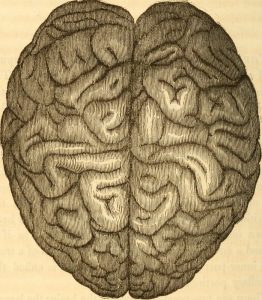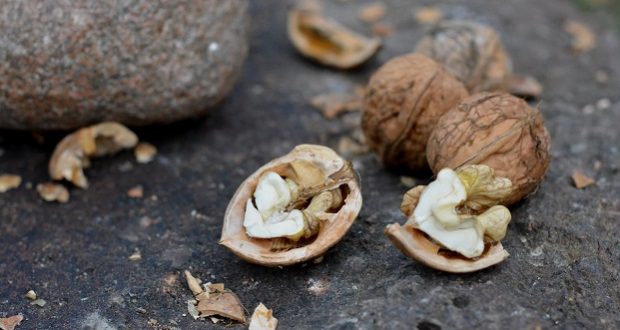 I came across another instance of traditional science backing up long held folk wisdom and it made me smile.
I came across another instance of traditional science backing up long held folk wisdom and it made me smile.
The research community is stacking up data that strongly suggests that consuming walnuts has a strong impact on brain health and function as we age.
The folk wisdom around walnuts being related to brain function began with the Greeks and the concept they called Doctrine of Signatures. This essentially means that the body part that a food resembles is the body part that is affected by that food.
For example, walnuts look like a brain so, according the Doctrine of Signatures, walnuts improve brain health.
 Another example would be, if you slice a carrot in half, it resembles the eye with the iris and pupil. Lo and behold, carrots support eye health.
Another example would be, if you slice a carrot in half, it resembles the eye with the iris and pupil. Lo and behold, carrots support eye health.
Red tomatoes, when cut in half crosswise, show four chambers that resemble the heart. Lycopene found in tomatoes is good for the blood and the heart itself. This concept goes on with sweet potatoes, avocados, figs, and oranges all having a body part they correspond to and, according to folklore, support the function thereof.
But, back to walnuts!
The research coming out over the past decade shows that walnuts clearly have an impact on brain health, specifically, reducing the amount of oxidative stress and inflammation that is built up in the brain as we age.
 Inflammation and oxidative stress that occurs throughout our life are believed to be what causes aging. Our bodies become less adept at cleaning up the mess that happens on a cellular level and, in the brain, this buildup is at least partially responsible for the cognitive decline that is often seen in the elderly.
Inflammation and oxidative stress that occurs throughout our life are believed to be what causes aging. Our bodies become less adept at cleaning up the mess that happens on a cellular level and, in the brain, this buildup is at least partially responsible for the cognitive decline that is often seen in the elderly.
Walnuts have lots of the good fats that nurture the body’s nervous and cardiovascular systems.
Research has shown that omega-3 fatty acids, found in walnuts and a host of other foods, can improve things such as abnormal heartbeats, triglyceride levels and blood pressure.
The interesting thing is, omega-3 fatty acids have been studied extensively and are very necessary for a healthy body, however, it seems the brain prefers the whole food rather than a supplement.
 Dementia, a decline in brain function often associated with aging, is on the rise world-wide as men and women’s life expectancy increases. While some mild cognitive decline may be inevitable, dementia should not be. Your genes may influence brain health in later life but evidence shows you may be able to beat your genetic disposition, so don’t use the excuse that it “runs in my family.”
Dementia, a decline in brain function often associated with aging, is on the rise world-wide as men and women’s life expectancy increases. While some mild cognitive decline may be inevitable, dementia should not be. Your genes may influence brain health in later life but evidence shows you may be able to beat your genetic disposition, so don’t use the excuse that it “runs in my family.”
There are even a couple of studies that show a diet with regular walnut consumption can slow the onset of Alzheimer’s disease, the most common type of dementia.
Other foods also have traditional science’s stamp of approval for long-term brain health:
- Berries
- Dark skinned fruits and vegetables (avocados, plums, cherries, kale, beets, etc.)
- Nuts in general but particularly walnuts
- Coffee, chocolate and olive oil in moderation
- Clean water
 Plenty of evidence also suggests that certain foods should be avoided or limited, such as processed and high sugar foods, soda, juices and other drinks with a high content of sugar.
Plenty of evidence also suggests that certain foods should be avoided or limited, such as processed and high sugar foods, soda, juices and other drinks with a high content of sugar.
An additional variable for brain health is cardiovascular exercise, which means exercise that gets your blood flowing.
The increase in heart rate provides oxygen to the brain and stimulates those hormones that have strong protective qualities for the brain. So, if you do nothing else to protect your brain and cognition, go for a long walk and throw some walnuts into your cereal every day. Your brain will thank you, and so will your loved ones.
Virginia Eaton is a health and fitness coach helping people reorganize priorities.




